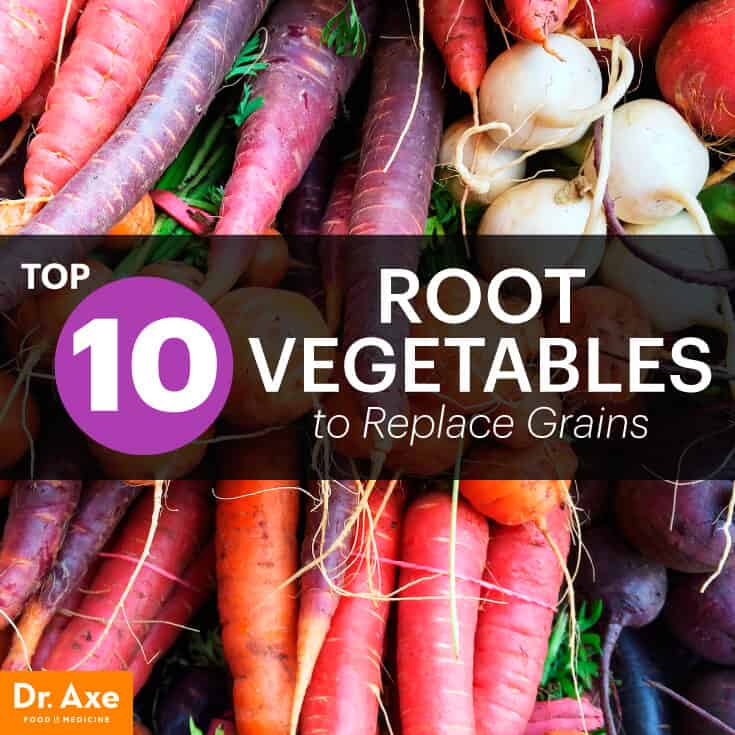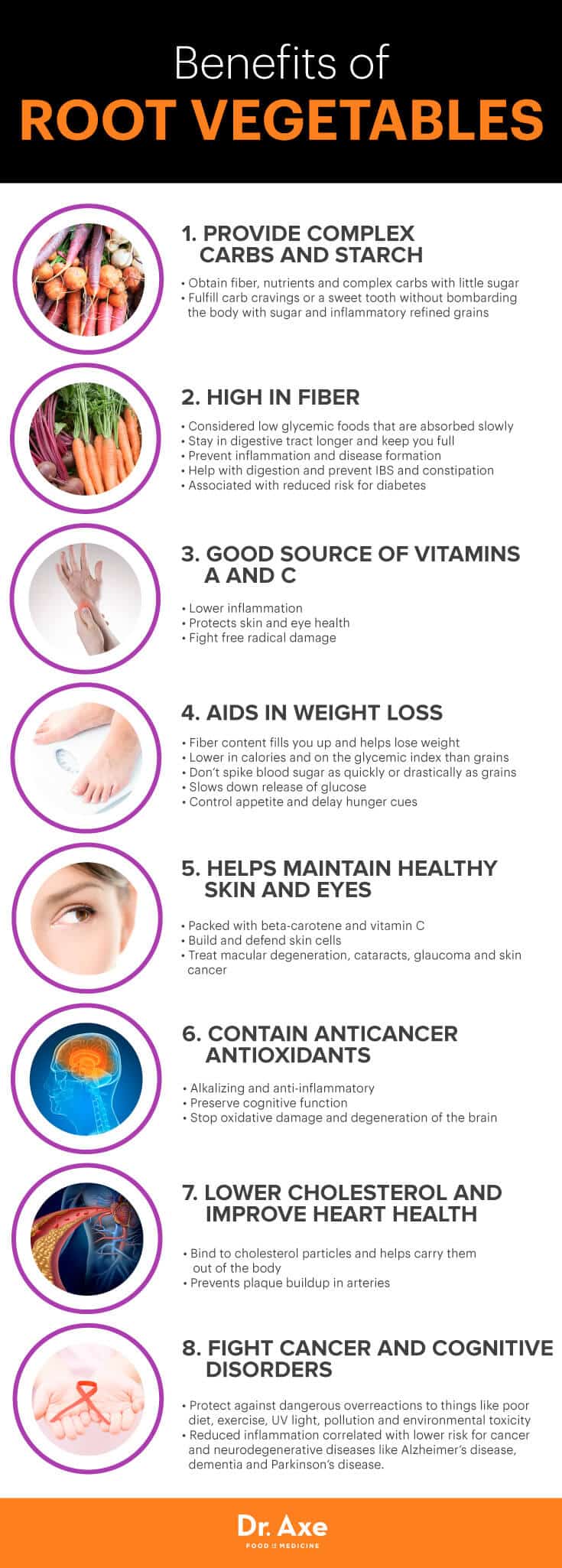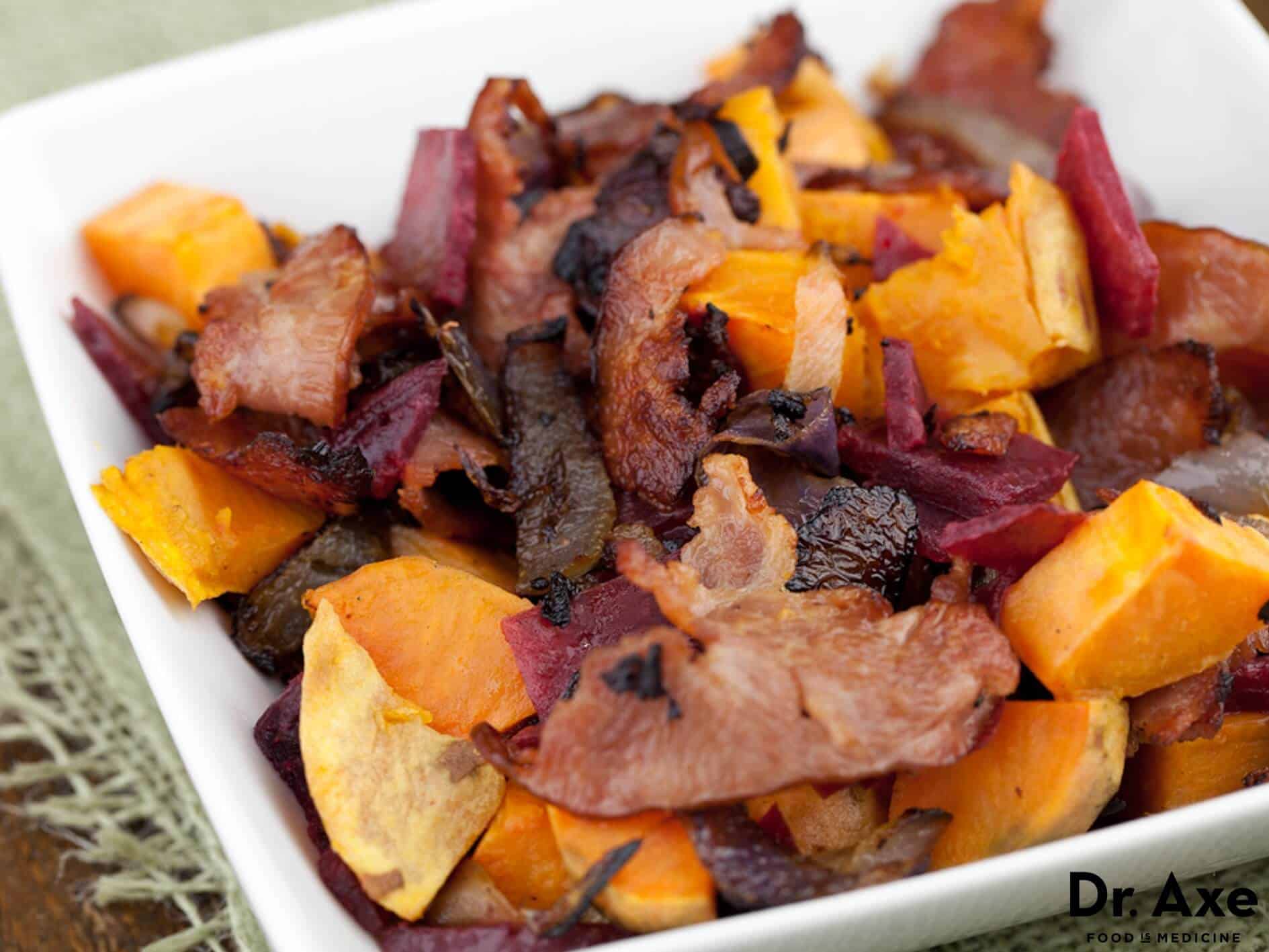Top 10 Root Veggies to Replace Grains

Root vegetables have been a staple in many South American and Asian diets for thousands of years. In fact, records show that certain root veggies like sweet potatoes were an important ingredient in folk medicine over 5,000 years ago, and they’ve supported undernourished populations around the world ever since.
Today, strong evidence exists that some of the vital nutrients found in many root vegetables — including vitamin A, vitamin C, potassium, magnesium and dietary fiber — can help fight cancer, diabetes, obesity, and inflammatory-based disorders like heart disease and arthritis.
When it comes to replacing grains in your diet with root vegetables, there are many benefits. First off, all root vegetables are naturally gluten-free, while many grains (especially the most popular kinds like wheat) are not. Gluten causes digestive issues and even autoimmune reactions in many people, whether they realize it or not.
Root vegetables are truly natural, unadulterated sources of complex carbohydrates, antioxidants and important nutrients. Plus, they tend to be lower in calories, have a lowerglycemic index load, and cause less digestive or inflammatory issues than many grains do. While their exact nutrition content differs between various types, most root veggies have about 50–100 calories per ½-cup cooked serving and three or more grams of fiber. This makes them a nutrient-dense choice and a preferred way to add starch and sweetness to your diet naturally.
8 Benefits of Root Vegetables
1. Provide Complex Carbs and Starch
While the average person consumes way more carbohydrates than may actually be beneficial, most people still feel and operate their best when they consume a certain moderate level of carbs from natural sources. Starchy root vegetables are a great way to obtain fiber and nutrients along with some complex carbs and relatively little sugar. This especially applies if you’re an athlete, child, someone looking to gain weight or if you exercise a lot. Starchy veggies also help to fulfill “carb cravings” or a sweet tooth without bombarding your body with sugar and inflammatory refined grains.
2. High in Fiber
Although they contain some natural sugars in the form of starch, root veggies are high in fiber and therefore they’re still mostly considered low glycemic index foods that are absorbed relatively slowly. High-fiber foods stay in your digestive tract longer, and in the process they keep you full.
Part of their fiber also holds valuable polysaccharides, which are found in plant foods and shown to exhibit multiple biological activities, including anticarcinogenic, anticoagulant, immune-stimulating and antioxidant effects. A high-fiber diet not only helps prevent inflammation and disease formation, but it also works wonders for helping with digestion and preventing IBS or naturally relieving constipation.
While many grains, especially refined grains and flour products that are low in fiber, are considered “fast carbs” that spike blood sugar abruptly, root veggies are known for being “slower-burning carbs.” According to many large studies, like one that appeared in the European Journal of Clinical Nutrition in 2012, higher root vegetable intake is even associated with a reduced risk for diabetes.
3. Good Source of Vitamins A and C
Root vegetables are some of the best sources of carotenoid antioxidants and vitamin A and C in the world. Beta-carotene, a precursor to active vitamin A, is found in high quantities in sweet potatoes, carrots, beets and other root vegetables and is crucial for lowering inflammation, protecting skin and eye health, and fighting free radical damage. Both vitamin A and vitamin C foods benefit the immune system by loweringinflammation that is at the root of most chronic diseases like cancer and heart disease.
There are two types of vitamin A that we acquire from foods. The type found in root veggies and other colorful fruits and vegetables is called “pro vitamin A,” a type of carotenoid antioxidant that is converted to retinol by the body after the food is ingested. Beta-carotene, a type of carotenoid found primarily in plants, needs to first be converted to active vitamin A in order to be utilized by the body.
4. Can Help You Lose Weight
One of the secrets to losing weight fast and easily? Up your fiber intake. While you might be hesitant to include more root vegetables in your diet because they’re starchy and higher in carbs than other veggies, their fiber can actually help you lose weight because it fills you up. Compared to grains, most root vegetables are lower in calories and lower on the glycemic index, which means they won’t spike your blood sugar as quickly or drastically.
The fiber in starchy veggies slows down the release of glucose (sugar), which is important for energy and insulin balance. Starchy vegetables eaten with a balanced meal can help control appetite and delay hunger cues, which is important for weight management, fighting cravings and reducing the risk of insulin resistance.

5. Help Maintain Healthy Skin and Eyes
If you want healthy, glowing skin, consider eating more root vegetables; many are packed with beta-carotene and vitamin C that helps build and defend skin cells. A high content of beta-carotene is used to convert vitamin A in your body that triggers DNA to produce new skin cells.
Beta-carotene also helps reverse free radical damage, which can lead to age-related eye disorders, sun spots or wrinkles, UV damage, and potentially skin cancer. In fact, a diet high in vitamin A and vitamin C can act like a natural treatment for macular degeneration, cataracts, glaucoma and skin cancer.
6. Contain Anticancer Antioxidants
You might not think of things like potatoes and turnips as high-antioxidant foods, but they definitely are. Many root vegetables are a great source of antioxidant flavonoids, which are actually responsible for some of their deep colors — like the orange of sweet potatoes or purple of beets.
Considered to be alkalizing and anti-inflammatory foods, nearly all root veggies supply carotenoid antioxidants like lutein and zeaxanthin — but that’s not all. Purple sweet potatoes contain the antioxidant anthocyanins, which has been shown to preserve cognitive function and stop oxidative damage and degeneration of the brain. And beets contain betalains, which are highly anti-inflammatory.
7. Help Lower Cholesterol and Improve Heart Health
A high-fiber diet filled with whole foods containing both soluble and insoluble fibers is key for heart health and balanced cholesterol and triglyceride levels. Eating fiber is a way to naturally lower cholesterol because it binds to cholesterol particles and helps carry them out of the body. This means cholesterol is less able to form sticky plaque buildup in arteries, which can raise the risk of heart disease, heart attacks or strokes. Many root vegetables also are potassium-rich foods, which is beneficial for healthy blood pressure, nerve signaling and fluid balance.
A 2009 study published in the Journal of Diabetes Science Technology found that aPaleolithic-type diet improved both cardiovascular risk factors and glycemic controlwhen compared to a standard diet or even “diabetes diet.” While the paleo diet included root vegetables, it did not include any type of grains. The results showed that the group following the Paleolithic diet for three months experienced statistically significant lower mean values of hemoglobin A1c, triglycerides, diastolic blood pressure, weight, body mass index and waist circumference.
8. Help Fight Cancer and Cognitive Disorders
Vitamin A found in many root vegetables has been correlated with better brain function, cognitive health and cancer protection. Inflammation and oxidative stress are two primary causes of cancer formation, but vitamin A, vitamin C and other antioxidants can act like natural cancer treatments and help lower the body’s inflammatory responses.
This means better protection against a dangerous overreaction to things like a poor diet, exercise, UV light, pollution and environmental toxicity. Reduced levels of inflammation are also correlated with a lower risk for neurodegenerative diseases like Alzheimer’s disease, dementia and Parkinson’s disease.
10 Healthiest Root Vegetables
1. Sweet Potatoes/Yams
These are probably most people’s top pick for a tasty root vegetable that has so many uses. Sweet potato benefits include a very high supply of vitamin A (they’re one of the best sources on Earth), potassium, vitamin B5 and vitamin C — in addition to fiber and slow-absorbing starch. Even though they’re called “sweet,” they’re actually lower on the glycemic index than regular white potatoes and help stabilize blood sugar better.
What’s the difference between yams and sweet potatoes? Sweet potatoes are lower in calories and higher in antioxidants, but yams contain higher levels of potassium. They have a similar taste and texture, so both make great choices.
2. Russet or Yukon (White) Potatoes
White potatoes might get a bad rap, but the truth is they do provide plenty of antioxidants and nutrients. Potato nutrition benefits include being a very high source of potassium, which is important for building strong bones and supporting heart health. In fact, potatoes can help lower your risk for dangerously low potassium even more than bananas and sweet potatoes. They have about 20 percent or more of your daily potassium in every potato.
White potatoes also contain a good dose of manganese — about 22 percent of your daily value in one potato — which is important for bone and nerve health. To preserve their potassium and other nutrients best, eat the skins and only lightly cook them — which means no deep-fried French fries!
3. Carrots
Carrots are one of the most popular veggies worldwide and can be eaten raw, cooked or juiced. Carrots and carrot juice get their signature orange color from antioxidants called carotenoids, which are known for protecting the eyes and skin. They also supply lycopene, lutein and zeaxanthin antioxidants. In addition to high levels of vitamin A, carrots also provide a good dose of vitamins C, D, E and K — plus magnesium, potassium and calcium.
4. Parsnips
As a member of the same plant family as carrots, parsley and celery, parsnips have a lot of the same benefits of celery, carrots and parsley. They’re a great source of dietary fiber, folate, potassium and vitamin C. About 1/2 cup of cooked parsnips provides three grams of dietary fiber, about 12 percent of the fiber you need daily. A high percentage of parsnips’ fiber is soluble, which is linked to a decreased risk of diabetes and high blood cholesterol. This same size serving also provides about 11 percent of your daily folate, which is important for energy, metabolism, nervous system health, synthesis of DNA and red blood cells formation.
5. Beets
Beet benefits are plentiful. Some evidence shows that beets can enhance your endurance during athletic performance and help you recover from exercise better. Beets naturally contain nitrates, which the body easily uses for muscle recovery, improved circulation, lower inflammation and increased physical performance.
Studies show that supplementing with the type of nitrates found in beets allows athletes to shave minutes off of their race times and experience less bodily stress from the exercise. Beets also naturally alkalize and detoxify the body, support hormonal health, and provide high levels of phytonutrients called betalains.
6. Turnips
Turnips are a member of the cruciferous family of vegetables, so they’re related to cancer-fighting veggies like broccoli, collard greens, cabbage, kale and Brussels sprouts. Like other cruciferous foods, turnips and turnip greens nutrition contain a type of phytonutrients called indoles that are known to reduce your risk for cancer, especially of the prostate, lungs, stomach and colon. High in calcium, magnesium and potassium, they’re also a heart-healthy food that supports balanced blood pressure, cholesterol and triglycerides.
7. Rutabaga
Rutabagas are essentially a cross between cabbage and turnips, so they provide many of the same benefits. They’re high in fiber and a great source of vitamin C, with about 47 percent of your recommend daily intake. Additionally, they’re a high source of zinc, which plays a role in immune health, brain function, mood regulation, metabolism and protection from physiological stress, and help fight zinc deficiency. With a similar taste to turnips and white potatoes, they come out great when roasted and caramelized.
8. Butternut Squash
With a high supply of beta-carotene, butternut squash not only tastes great, but it’s a cancer defender and immune system booster. Generally speaking, the darker the orange hue of vegetables, the higher the content of beta-carotene.
Like other carotenoids, beta-carotene can help turn up communication between cells that destroy cancerous tumor growth and promote lower levels of toxicity. Butternut squash tastes great roasted but can also work in baked goods to take place of sugar or excess butter and dairy.
9. Winter Squash
Just like closely related butternut squash, winter squash provides protective antioxidants, including alpha-carotene, beta-carotene, lutein, zeaxanthin and beta-cryptoxanthin. These are considered essential for eye health and preserving vision into old age since they protect the cornea, macula and retina from damage.
Winter and butternut squashes both have high starch contents, which means they contain polysaccharides found in their cell walls. These polysaccharides include pectins and other starch-related components that have antioxidant, anti-inflammatory and antidiabetic properties.
10. Jerusalem Artichokes
An extremely good source of fiber, every one-cup serving of cooked Jerusalemartichokes (also called “sunchokes”) provides 10 grams of fiber, in addition to three grams of protein and just 100 calories. They’re also a great source of vitamin A (with about 25 percent of your daily needs in every serving), plus iron and potassium. In fact, as one of the highest plant sources of iron with 28 percent of your needs, Jerusalem artichokes combat iron deficiency and are a great way to support nerve health, red blood cell formation, anemia prevention and a healthy metabolism.
Root Vegetable Recipes
Sweet Potato Beet Hash Recipe
Total Time: 45 minutes
Serves: 2–4
INGREDIENTS:
- 1 large sweet potato, peeled and cut into cubes
- 1 large beet, peeled and cubed
- 1 tablespoon coconut oil, melted
- Sea salt and black pepper
- 1 slice turkey bacon
- 1 onion, diced
DIRECTIONS:
- Preheat oven to 400 degrees F. Toss the sweet potatoes and beets with coconut oil and season with salt and pepper. Place on a baking sheet and bake for 25–30 minutes.
- In a skillet over medium heat, add the turkey bacon and cook until bacon is crispy. Add the onions and season with salt. Cook until onions caramelize. Add the sweet potatoes and beets to the pan and stir, cooking for another 5 minutes.

Maple Glazed Rosemary Carrots Recipe
Beet and Goat Cheese Salad Recipe
Butternut Squash Bake Recipe
Turnip Fries Recipe
Whipped Sweet Potatoes Recipe
Concerns and Interactions of Root Vegetables
While they offer a load of benefits, portion control is still important when it comes to root vegetables, especially if you’re struggling to reach and maintain a healthy weight, stabilize blood sugar, reduce overall sugar in your diet, or reverse and treat diabetes.
How much is the right amount for you? This depends a lot on your individual needs, body type, metabolism and level of physical activity. For example, people who exercise often can get away with eating more carbohydrates in general than people who are more sedentary. I recommend one to two small servings of various root vegetables a day and see how your body responds. Each serving should be about ½ cup cooked. As part of an otherwise balanced diet with healthy amounts of quality protein, fat and non-starchy veggies, this amount shouldn’t cause gain weight for most people and will provide a good course of nutrients.
Comments
Post a Comment